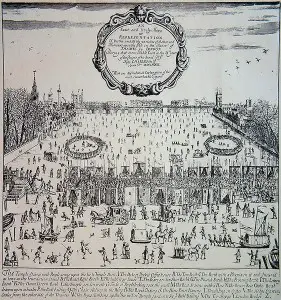
The British news is full of headlines like “100 DAYS OF HEAVY SNOW: Britain now facing worst winter in SIXTY YEARS warn forecasters” and it is predicted that “Arctic air will roar in from the North Pole later this week, triggering the start of the worst winter in many people’s lifetimes.”1 Brrr!
These news reports and weather alerts started me thinking about the Little Ice Age which affected Europe and North America between 1300 and 1870, and which had its peak between 1600 and 1800. Can you imagine trying to cope with freezing temperatures without central heating, thermal undies and double-glazing? I can’t. We just don’t know how lucky we are, do we?
In A dictionary of chronology or The historian’s companion being an authentic register of events, from the earliest period to the present time (1835), Thomas Tegg records heavy frosts in Europe, including 1434 when the River Thames in London froze over “below bridge [London Bridge] to Gravesend” from 24th November 1433 to 10th February 1434, and 1683 when it froze for 13 weeks.2 In 1515 carriages travelled on the icy surface from Lambeth to Westminster and “it is said the frost and snow were so severe that five arches of London Bridge were ‘borne downe and carried away with the streame’.”3 We know from Edward Hall’s chronicle that the Thames also froze in the winter of 1536 and that King Henry VIII travelled to Greenwich on its frozen surface:
“This yere in Decembre was the Thamis of London all frozen ouer, wherefore the kyges Maiestie with his beautifull spouse quene Jane, roade throughout the citie of London to Grenewich.”4
The ice was often thick enough for fairs to be held on the Thames, these were known as frost fairs. Although the earliest recorded frost fair is thought to have taken place in 1608, in the reign of James I, Thomas Tegg records that the Thames was frozen for six weeks in AD 695 and that “booths were built on it”.5 In December 1564, boys played football on it and shot “at marks”,6 and Queen Elizabeth I is said to have also practised archery on it.7 The most famous frost fair is that of winter 1683/4, in Charles I’s reign, when the Thames was frozen from mid November to early February. The English writer, diarist and gardener John Evelyn recorded:
“Coaches plied from Westminster to the Temple, and from several other stairs too and fro, as in the streets; sleds, sliding with skeetes, a bull-baiting, horse and coach races, puppet plays and interludes, cooks, tipling and other lewd places, so that it seemed to be a bacchanalian triumph, or carnival on the water.”8
And another witness wrote of “a street of booths built from the Temple to Southwark, where were sold all sorts of goods imaginable, namely, cloaths, plate, earthenware, meat, drink, brandy, tobacco, and a hundred sorts of commodities not here inserted.”9 Ladies shopped at these booths, while the men enjoyed skittles and bear-baiting.
Of course, even though Britain is set to suffer heavy snow and freezing temperatures the Thames is unlikely to freeze again. The last frost fair, which saw an elephant crossing the river, took place in 1814 when the Thames froze for the last time.10 Jonathan Schneer, in his book “The Thames”, explains that “with the replacement of old London Bridge by a new one with wider arches, the river continues to flow, no matter how cold”11 and we know that the Thames has been embanked several times since the early 19th century. It did, however, freeze upstream at Windsor in the Great Freeze of 1963, which allowed people to walk on it and children to play “bicycle hockey”.12
So, I don’t think there will be frost fairs, elephants walking on the ice or the Queen travelling by sleigh on the Thames this winter but I’m sure that Brits will make the best of the bad weather.
Notes and Sources
- 100 DAYS OF HEAVY SNOW: Britain now facing worst winter in SIXTY YEARS warn forecasters, The Express
- A dictionary of chronology or The historian’s companion being an authentic register of events, from the earliest period to the present time, Thomas Tegg (1835), p171
- Old and New London, Volume 3, Walter Thornbury (1878), p311-322
- Hall’s Chronicle, Edward Hall, p823
- Tegg, p171
- Thornbury
- The Thames, Jonathan Schneer (2005), p72
- Evelyn quoted in London: Portrait of a City, Roger Hudson (1998), p8
- Thornbury
- River Thames Frost Fairs
- Schneer, p74
- Histories of Windsor: The Great Freeze of ’63